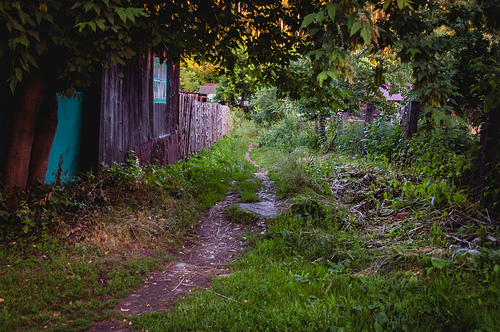
Image: Flickr/strogoscope
November
.
Bats circle amid the yellow withered plane trees
that hover above the old church cupola.
The sad singing of the flying cranes
grieves the meadow. Autumn toasts
white winter. The storm on the other side
has no pity, even for itself, and the fire
will melt the wind’s rabid song.
Twilight masters the soul—it’s Saturday.
Evening fog blankets the earth.
The priest has finished praying.
Melted prayers glimmer on his white beard.
The eye is blind. The wind-demon tears the world to rags.
My feet sink heavily into amber mud.
I drown in yellow leaves: please bury me.
January 10, 1916
My Village in Spring
.
On this hot spring day the sun
splits waves of peach and quince
blossoms. Every tree yearns
to suddenly undress.
The birds strive for euphony,
tuning their treble to labor’s march.
Bravely do their hearts beat,
pulsating with spring’s breath.
The virgin earth is strained,
ready to explode into an avalanche.
The earth knows the harvests
by the way the wind blows.
Busy sounds rumble
from one village to the next.
If a mountain fell, its pieces
would be dragged home.
The mountains stand stubborn.
Ice floes tumble down the cliffs,
awaiting the avalanche’s collapse,
to reduce the flood’s rain to foam.
I don’t know what it meant,
when they sang old songs.
But I know that my native Imeretia
has been taken over by tea leaves and rain.
1926
A Poem’s Pain
.
I am back in my village, a child in fever.
The women sing sweet songs of roses
and violets to appease the measles.
Mother’s tears make the chords ring.
My sisters and brothers stand over me.
They can’t hide their joy now that I’m free.
Mother promises treats and presents.
They have stanched my pain, these measly kings.
A bushel of apples stands in the corner.
The neighbors keep bringing more:
cherries, sour and sweet, berries, wild beets
frozen sugar twisted into rings.
My head is wrapped in cornhusks.
I bathe in the rose water’s rain.
Is it my blanket or are those angel’s wings
that prettily cover me?
The wind from the plains wars
with the enflamed peach trees.
Those branches blessed the measles
and had pardoned me.
If my family would only sing
to me again the lullaby of childhood,
I wouldn’t hesitate to plant the knife
into my heart, to face this pain.
Dear reader, if you want
to know me, listen to my poems.
I no longer hear their melody.
You can have these words, if you wait.
Suddenly, pain strikes me.
The words inside me sing.
The Black Sea
Beautiful Black Sea,
who created the sweet voice
that caused me to shiver
when you sang of Medea?
I yield to this hurricane of fantasies
to the dragon’s fiery jaw,
I hunt for the Golden Fleece.
I yield to fatality.
Say what you will: poetry equals immortality.
An avalanche buries me. The unsaid
embraces me. The waves of Mitos clasp me
as I sing the new songs.
New Argos, Orpheus I sing.
I want to speak of our heroes,
sweet as this dark sea,
but I choke on my creeds
This city resembles a dove amidst the palms.
It flies towards the mountains and to me.
The moon hides in the clouds’ waves,
as though demons had commanded him to drown. Like the Argonauts’ song,
this August night bends into the heavens,
making the sky the earth.
I fall in love again.
Gagra, 1925
Translator’s Note
 Over the course of a quarter century (from roughly 1911 to 1937), the Georgian modernist Titsian Tabidze crafted a visionary poetics that was formally innovative and politically courageous in equal measures. While, like many of the greatest poets of the Soviet era, Titsian suffered for his disloyalty to the Soviet state, Titsian’s suffering has a more existential source in his love for his native culture and the pain induced in him by his alienation from it. The poignancy of this pain is intensified by his ties to Georgia’s affective landscapes, as reflected in the poems translated here.
Over the course of a quarter century (from roughly 1911 to 1937), the Georgian modernist Titsian Tabidze crafted a visionary poetics that was formally innovative and politically courageous in equal measures. While, like many of the greatest poets of the Soviet era, Titsian suffered for his disloyalty to the Soviet state, Titsian’s suffering has a more existential source in his love for his native culture and the pain induced in him by his alienation from it. The poignancy of this pain is intensified by his ties to Georgia’s affective landscapes, as reflected in the poems translated here.
Titsian’s robust conception of his literary craft in an age of atrocity is an inspiration to readers interested in expanding the domain of poetry to the political realm. Across different genres and settings, Titsian reveals how the literary imagination effects political change in the world.
Unfortunately for readers today, Titsian’s own existence was circumscribed when he was only forty-one years old by the power structures he contested and overturned in his work: after publicly siding with his friend, modernist poet Paolo Iashvili, who was targeted by the Soviet state, Titsian was himself accused of working as a spy against the state. He was executed in 1937, and much of his writing was destroyed.
•
 Rebecca Gould is the author of Writers and Rebels (Yale University Press, 2016), which discusses Titsian’s poetry and life in depth. She is also the translator of Alexandre Qazbegi’s The Prose of the Mountains: Tales of the Caucasus (Budapest: Central European University Press, 2015) and After Tomorrow the Days Disappear: Poems of Hasan Sijzi of Delhi (Northwestern University Press, 2016). She was awarded an American Literary Translators Association Travelling Fellowship for her translations of Titsian Tabidze and her translations of Qazbegi have been supported by the Georgian Literature in Translation Program, Georgian National Book Center, Georgian Ministry of Culture. She teaches translation studies at the University of Bristol.
Rebecca Gould is the author of Writers and Rebels (Yale University Press, 2016), which discusses Titsian’s poetry and life in depth. She is also the translator of Alexandre Qazbegi’s The Prose of the Mountains: Tales of the Caucasus (Budapest: Central European University Press, 2015) and After Tomorrow the Days Disappear: Poems of Hasan Sijzi of Delhi (Northwestern University Press, 2016). She was awarded an American Literary Translators Association Travelling Fellowship for her translations of Titsian Tabidze and her translations of Qazbegi have been supported by the Georgian Literature in Translation Program, Georgian National Book Center, Georgian Ministry of Culture. She teaches translation studies at the University of Bristol.
